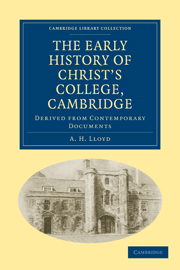Book contents
- Frontmatter
- Preface
- Contents
- LIST OF ILLUSTRATIONS
- List of Abbreviations
- Chronological Summary
- Dedication
- Chapter I William Byngham, the First Founder
- Chapter II The Dispute with John Langton
- Chapter III The First Royal Licence, 1439
- Chapter IV The Expansion of the Milne Street Site
- Chapter V The Royal Licences of 1442
- Chapter VI Marking Time: 1443 to 1446
- Chapter VII The Royal Licence of 1446 and its period
- Chapter VIII The Foundation Charter of the College of Godshouse and its period
- Chapter IX The Relationship of Godshouse and Clare Hall
- Chapter X The Last Days of William Byngham
- Chapter XI The Proctorship of John Hurte, 1451–1458, and of William Fallan, 1458–1464
- Chapter XII The Proctorship of William Basset, 1464–1477
- Chapter XIII The Proctorship of Ralph Barton, 1477–1490
- Chapter XIV The Proctorship of John Syclyng: Early Years, 1490–1496
- Chapter XV The Proctorship of John Syclyng: Later Years, 1496–1506
- Chapter XVI The Negotiations between Godshouse and the Lady Margaret
- Chapter XVII Syclyng's Death and Will
- Chapter XVIII The Buildings and Furniture remaining from the Godshouse period
- Chapter XIX Godshouse and Christ's College
- Appendix
- Index
- Plate section
Chapter II - The Dispute with John Langton
Published online by Cambridge University Press: 05 October 2010
- Frontmatter
- Preface
- Contents
- LIST OF ILLUSTRATIONS
- List of Abbreviations
- Chronological Summary
- Dedication
- Chapter I William Byngham, the First Founder
- Chapter II The Dispute with John Langton
- Chapter III The First Royal Licence, 1439
- Chapter IV The Expansion of the Milne Street Site
- Chapter V The Royal Licences of 1442
- Chapter VI Marking Time: 1443 to 1446
- Chapter VII The Royal Licence of 1446 and its period
- Chapter VIII The Foundation Charter of the College of Godshouse and its period
- Chapter IX The Relationship of Godshouse and Clare Hall
- Chapter X The Last Days of William Byngham
- Chapter XI The Proctorship of John Hurte, 1451–1458, and of William Fallan, 1458–1464
- Chapter XII The Proctorship of William Basset, 1464–1477
- Chapter XIII The Proctorship of Ralph Barton, 1477–1490
- Chapter XIV The Proctorship of John Syclyng: Early Years, 1490–1496
- Chapter XV The Proctorship of John Syclyng: Later Years, 1496–1506
- Chapter XVI The Negotiations between Godshouse and the Lady Margaret
- Chapter XVII Syclyng's Death and Will
- Chapter XVIII The Buildings and Furniture remaining from the Godshouse period
- Chapter XIX Godshouse and Christ's College
- Appendix
- Index
- Plate section
Summary
Before Byngham could make use, for the purposes of his college, of the land bought from Fordeham and Randekyn (Cat hostell as it is seen to have been called), he was confronted with a startling proposal, attractive enough to have induced him to give it serious consideration, though its adoption would have involved the surrender of his site and the selection of another some distance away. This proposal appears to have been made by the Chancellor of the University and, though it is of singular interest and had consequences of much importance both to Godshouse and the university, it has escaped the attention of all historians of both institutions.
There is no record preserved of the preliminary conversations, though the Chancellor maintained that they had been brought to the stage of agreement between the parties. This is an ex parte statement and the Chancellor admits that there was no writing between the university and Byngham, and that he had no remedy at common law; he was driven to appeal to the Chancellor of England, and it is the fortunate preservation of John Langton's petition in the early chancery documents in the Public Record Office that allows this interesting controversy to be brought to light after an oblivion of nearly 500 years.
After the present writer had found and read the original document he discovered that it had already been printed by Mr W. T. Barbour in vol. iv of the Oxford Studies in Social and Legal History (Vinogradoff).
- Type
- Chapter
- Information
- The Early History of Christ’s College, CambridgeDerived from Contemporary Documents, pp. 22 - 34Publisher: Cambridge University PressPrint publication year: 2010First published in: 1934



